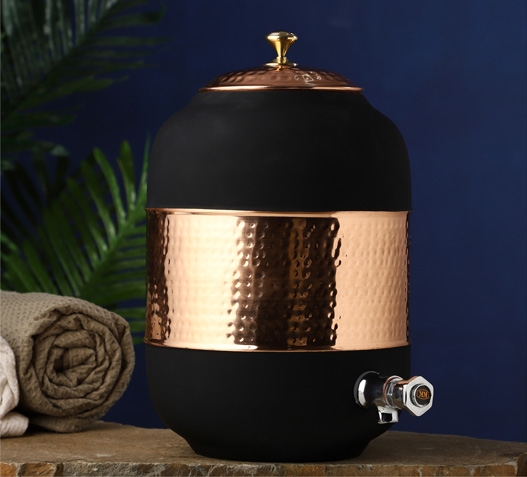Just how to Choose the Right Copper Products for Your DIY Projects and Home Renovations
Just how to Choose the Right Copper Products for Your DIY Projects and Home Renovations
Blog Article
Checking Out the Diverse Applications of Copper Products in Modern Industries
Copper items have developed themselves as vital parts throughout a myriad of modern industries, primarily because of their remarkable conductivity, malleability, and resistance to corrosion. From boosting the performance of electric systems to playing an important function in renewable resource technologies, the flexibility of copper is apparent. Additionally, its recyclability positions it as a lasting choice in manufacturing and electronics. As sectors increasingly focus on advancement and sustainability, the varied applications of copper necessitate a closer examination, particularly concerning their potential effect on future ecological practices and technological improvements.
Electric Applications of Copper
Copper is a necessary product in the electrical market, making up about 60% of the overall need for non-ferrous steels worldwide - Copper Products. Its superior electric conductivity, which is almost twice that of aluminum, makes it the recommended selection for a vast array of electric applications. From electrical wiring systems in business and domestic buildings to high-voltage power transmission lines, copper makes sure effectiveness and reliability in power shipment
In addition to electrical wiring, copper is indispensable to the production of electrical parts such as electric motors, generators, and transformers. These components leverage copper's thermal conductivity and pliability, necessary for warmth dissipation and efficient efficiency. Copper's resistance to rust improves the lifespan and resilience of electrical systems, making it a cost-effective option in the long term.
The development of renewable power resources, such as solar and wind power, has better enhanced the demand for copper in electric applications. As industries transition in the direction of sustainable power options, copper's function ends up being much more important. Overall, the convenience and performance characteristics of copper strengthen its standing as a keystone product within the electrical field, driving innovation and efficiency throughout different applications.
Plumbing and Piping Solutions
In modern plumbing systems, the selection of products dramatically influences both functionality and durability. Copper has actually arised as a favored alternative because of its distinct homes, consisting of corrosion resistance and antimicrobial attributes. These features make certain that copper piping remains safe and durable for delivering drinkable water, a vital factor to consider in residential and industrial applications.
Among the crucial benefits of copper in plumbing is its capability to endure heats and pressures, making it ideal for a selection of applications, from warm water systems to heating and cooling networks. In addition, copper's adaptability enables easier installment in complicated piping formats, minimizing the danger of failures and leaks.
An additional noteworthy advantage is copper's lengthy life expectancy, often surpassing half a century with correct maintenance. This long life not only minimizes substitute costs but additionally adds to lasting techniques by lowering waste. Furthermore, copper's recyclability lines up with contemporary ecological standards, advertising a round economy within the pipes market.
Copper in Renewable Resource
The flexibility of copper extends past pipes applications, playing an essential function in the eco-friendly energy market. In solar panels, copper is used in photovoltaic cells and electrical wiring, promoting efficient energy conversion and transmission.

Furthermore, as the global demand for electric vehicles (EVs) rises, copper's function in battery systems and billing framework comes to be also more significant. The material's ability to perform power efficiently is indispensable to the performance of EV batteries, improving variety and billing speed.
Copper's Role in Electronics
Electronics making counts greatly on copper's outstanding residential or commercial properties, particularly its high electrical conductivity and thermal performance. These qualities make copper a suitable option for a large range of electronic parts, including connectors, circuit card, and electrical wiring. The steel's capacity Read More Here to successfully transmit electric signals makes certain marginal power loss, which is vital in high-performance digital devices.
Moreover, copper's thermal conductivity plays a substantial role in warmth dissipation, securing sensitive components from overheating. This is particularly essential in contemporary electronic devices, where portable layouts lead to enhanced heat generation. Copper is also preferred for its malleability and ductility, enabling it to be easily shaped into intricate styles that fulfill the demands of sophisticated digital applications.
With the increase of customer electronic devices, telecoms, and electric automobiles, the need for copper in the electronic devices sector proceeds to grow. As technologies in innovation develop, copper stays essential to achieving higher efficiency and integrity in electronic products. Its recyclability additionally improves its allure, as makers look for sustainable remedies without jeopardizing high quality. Hence, copper stays a keystone material in look at this website the ever-expanding field of electronics.
Innovative Utilizes in Manufacturing

One remarkable application remains in additive manufacturing, where copper-based products are utilized in 3D printing procedures. This enables for the creation of lightweight parts and intricate geometries, particularly in the aerospace and automobile markets. Additionally, copper's thermal conductivity makes it an ideal choice for heat exchangers, improving effectiveness in industrial air conditioning systems.
Additionally, the increase of smart manufacturing has seen the incorporation of copper in IoT tools, where its conductive capabilities support sophisticated picking up innovations. In the world of renewable power, copper is crucial in the manufacturing of solar panels and wind generators, assisting in much more reliable energy conversion and distribution.
As industries aim for sustainability and innovation, copper's adaptability and performance proceed to place it as a crucial product, driving advancements in production and adding to the advancement of smarter, extra reliable products.
Verdict
The essential role of copper in eco-friendly energy and its vital function in electronics highlight its relevance in advancing sustainable methods. Collectively, these applications show copper's crucial payment to technological progress and industrial effectiveness in contemporary society.
From enhancing the efficiency of electric systems to playing an important duty in sustainable power innovations, the flexibility of copper is noticeable. As sectors significantly prioritize advancement and sustainability, the diverse applications of copper necessitate a closer evaluation, especially concerning their possible effect try this on future technological advancements and environmental practices.
The development of eco-friendly power resources, such as solar and wind power, has even more increased the need for copper in electric applications. On the whole, the flexibility and performance qualities of copper solidify its condition as a cornerstone product within the electric sector, driving advancement and performance across numerous applications.
The versatility of copper expands beyond pipes applications, playing an essential role in the sustainable power market.
Report this page